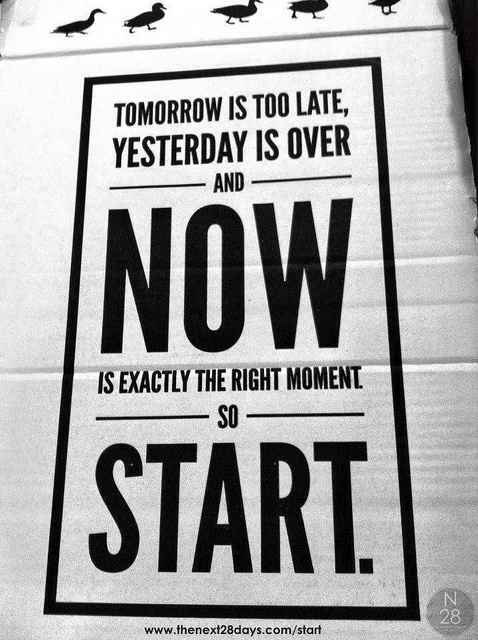Physical Address
304 North Cardinal St.
Dorchester Center, MA 02124

 We’ve been writing about the first steps to starting a business over the past few weeks. In case you missed them, we’ve covered stuff like figuring out if your idea will earn enough money to support you and the number one thing you should do.
We’ve been writing about the first steps to starting a business over the past few weeks. In case you missed them, we’ve covered stuff like figuring out if your idea will earn enough money to support you and the number one thing you should do.
Now that you have an idea and you’ve successfully determined that your idea could conceivably (if all goes right) produce enough income to support you, it’s time to take a closer look at your idea and figure out if this is something you really, really want to do. Experts like Chris Dixon and Brad Feld called it Product/Founder Fit.
This is the time to get brutally honest with yourself.
Is this an idea that you are excited about? Will you get bored with this business before you make it successful? Do you have the skills to get your company off the ground?
Without Product/Founder fit, it will be that much harder to find success.
Let’s say you have an idea for a new email app that solves all the things that bug you about gmail and hotmail. But you don’t know how to program an app. In fact, the only thing you know about email is how to open yours. But your idea is fantastic!
It probably won’t matter how good the idea is. Your skills don’t match your idea very well. That’s not to say you won’t succeed. But it will be tough.
On the other hand, imagine you notice that your neighborhood doesn’t have a Greek restaurant. You just happen to make the best tzatziki and souvlaki in the world. But more than that, you’ve managed a restaurant before and you have several friends who will hire you to cater their events. You’re excited about the potential opportunity in front of you and can’t wait to get started. That’s Product/Founder Fit.
Here’s our list of eight things that you should consider (as a startup entrepreneur) to make sure your idea for a new business fits your ability and desire to build it:
1. Passion for the idea.
There is some debate about whether passion for the idea is absolutely necessary to start a business. It’s not. But if you have passion for solving the problem your product or service is designed for, you’ll be ahead of the founder who doesn’t. Because you’ll care just a little bit more about the details. And the people who need your product or service. When things get hard, your passion keeps you going. So while it’s not a requirement for success, it certainly doesn’t hurt.
How you define your idea may help you find the passion. It’s our guess that Mark Zuckerberg isn’t very passionate about helping people play Farmville and CandyCrush, or share the latest listicle and cat photos. But he is passionate about technology and building a great company. He’s passionate about dominating the social media world. So what are you passionate about and how does that give you an advantage?
 2. Knowledge and skills to build your idea into a business.
2. Knowledge and skills to build your idea into a business.
Entrepreneurs often think they can do things they’ve never done before. Most of us over-estimate our abilities. But that doesn’t make it true. Have you managed people before? Have you built and scaled a software application? Have you worked in sales or created a sales team? Be aware of your skill set and what you can actually do well. If your business idea requires you to take on projects you have no experience with, your chances of failure go up. Again, it doesn’t mean you’ll fail. Just that success is harder. (This may be a good time to find a co-founder who can compensate for your weaknesses).
3. Do you have the money?
Startups don’t have to be expensive. But they’re usually not free. If your idea for a business is an online application, you might be able to build it for a few hundred dollars. Or a few thousand. If you require an office or retail location, your new venture may be several thousand dollars or more. Whatever your situation, you need enough for your startup costs, plus enough to carry you through until your revenues cover your costs. If you don’t have the money, you should rethink your idea. Click here for a simple primer on estimating your operating costs.
4. Do you have the time?
If you’re working on your startup idea at night while you work your day job to pay the bills, how much time can you put into the new venture? How long will it take you to build your product (double your initial estimate—these things always take longer than you think). If you’re working on the new business with all your time, how long until you run out of money? It can take hundreds, maybe even thousands of hours to get a product built and out to market. Do you have enough time to build yours?
5. Do you know the right people?
You can build a business without the help of anyone, but knowing the right people can make things a lot easier. Let’s say you want to start an employment recruiting business (headhunting). Who’s in your network? Do you have relationships with several businesses with recruiting needs? Do you have a way to connect with potential recruits? If you have a product idea that will sell through retail stores, do you have a relationship with a wholesaler or store buyer who can help get your product on the shelves? The right people can grease the skids for your startup.
Even if you are starting a relatively simple business, you’ll still need help from a few people. At some point you’ll need an attorney, an accountant, and someone to help with logo design and a website. You’ll need suppliers, partners, and of course customers. A good network gives you a big advantage.
6. Can you build something that other people want?
Ultimately this is part of finding a fit with the market, but while your idea may appeal to some customers, the real question is, can you create the solution? I met a group of smart people who found a real market problem in medical recruiting. Potential customers expressed a real pain point that wasn’t addressed by the market. Not only that, the existing solutions are very expensive. Customers unanimously said they would buy the solution. But the team just couldn’t build the product. They spent lots of time figuring out how the product would work. Even trying prototypes. But when it came down to releasing the product, they couldn’t get it done.
 7. Do you have the skills to market your business?
7. Do you have the skills to market your business?
Entrepreneurs ready to start a business often focus on their core competency. Take for example the woman who chooses to start a bakery because she make great bread. Really good bread. And her pie recipes aren’t too bad either. But once the bread is in the oven, how will she attract customers? Do you know how to build an email list and write a regular newsletter? Have you ever designed a retail store or shelf display? Do you know how to find potential partners who can help get the word out? Can you come up with an offer that will bring paying customers in the door? Don’t overlook what it takes to market your business idea.
8. Do you have the ability to focus until everything is done?
This may be the most important point. Startups can take years to become successful. Is your idea compelling enough that you won’t quit before you succeed? Many businesses fail because the owner loses interest in the idea long before the idea has time to succeed.
If you answered yes to most of the questions above, then you probably have a pretty good fit with your product. You don’t have to be an expert in every thing. Maybe you have money, but need help with marketing. As long as you recognize where you are weak, you can find someone to help.
But be brutally honest with yourself. Do you have the Product/Founder Fit you need to start a business? Now get started.
Photo credit: Next Twentyeight, Tellatic, and rawdonfox.